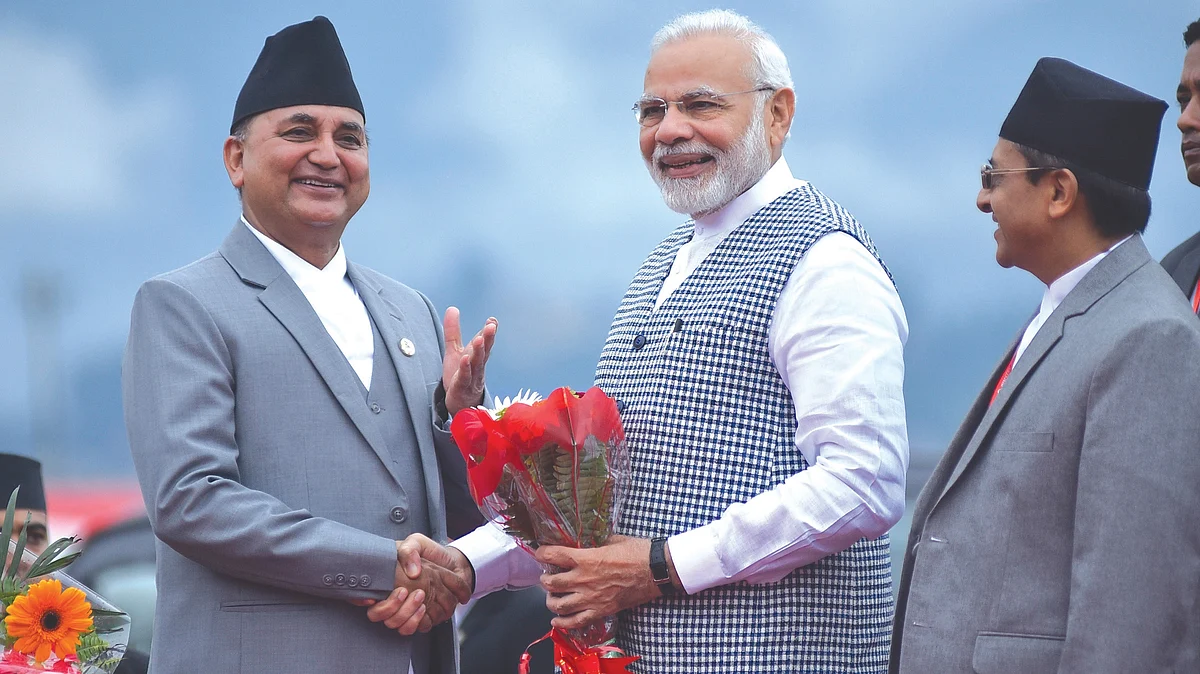Living with Modi’s foreign policy ‘blunder’ in Nepal
Even as the two countries have enjoyed a close defense relationship, premised in the 1950 Treaty of Peace and Friendship, the pro-India sentiment among the Nepalese troops is fast waning

Pushpa Kumar Dahal ‘Prachanda’, Nepal’s former Prime Minister and co-chairman of the ruling Communist Party, remarked at a lecture in New Delhi last week that his country had never been more politically stable and democratic than it is these days. A primary reason, he noted, was that the Himalayan democracy, sandwiched between China and India, had learnt to ‘balance’ its relations with both of its bigger neighbours.
On the same day, China ended India’s monopoly on providing sea access to Nepal as the one-party state opened four of its seaports, Shenzen, Lianyungang, Zhanjiang and Tianjin, to Nepalese exports.
The next day, China’s state news agency Xinhua reported that Nepal had unilaterally pulled out of the joint military drills of BIMSTEC (Bay of Bengal Initiative for Multi-Sectoral Technical and Economic Cooperation) nations, scheduled for September 10 in Pune. The decision to hold the sevenc-country military exercise was apparently reached at the BIMSTEC Summit in Nepal in the last week of August, attended by Prime Minister Narendra Modi.
Nepalese media reported that the ‘verbal’ instructions for the Army came directly from the office of Prime Minister KP Oli, the chairman of the Nepal Communist Party, who has made no secret of his admiration of China and aversion towards India, a theme of his election campaign.
So, when Prachanda was trying to paint a rosy picture of India-Nepal relations at his talk in New Delhi, the irony wasn’t lost on the audience members, comprising serving and retiring diplomats, academics and retired army personnel.
“Would you say that you are more pro-India, while Prime Minister KP Oli is pro-China in Nepal’s government,” questioned Major General (retired) Ashok Mehta, a member of Track 2 dialogue between India and Nepal besides being an author of a book on Nepal’s Army.
Prachanda’s response on the internal political forces of Nepal hid as much as it disclosed, as he skirted around a controversy. But the developments succeeding his speech have revealed more than Prachanda would have.
“Despite what Prachanda said during his India visit about no ongoing effort to play India against China, the present government led by PM KP Oli is toeing an anti-India line,” Mehta later told National Herald.
“One must not forget that opposition to India was the cardinal issue on which Oli won the election,” added the veteran Nepal watcher.
Recalling KP Oli’s maiden visit as Prime Minister was reciprocated by the visit of PM Modi, Mehta said that the anti-India lobby wasn’t in favour of an overt tilt towards New Delhi.
The Indian Army veteran, who has watched Nepalese Army close quarters, predicted that the pulling out of the BIMSTEC drills was also possibly backed by the new Chief of Staff of Nepal, Staff General Purna Chandra Thapa, who assumed office on September 9.
Even as the two countries have enjoyed a close defense relationship, premised in the 1950 Treaty of Peace and Friendship, the pro-India sentiment among the troops is fast waning.
“I also think that the Nepalese Army are not too happy with the procuring of military equipment from India, including the INSAS rifle and other non-lethal military equipment,” said Mehta.
At the same time, increasing military engagement with China is causing anxieties among officials in India.
Sources in the Ministry of External Affairs are seeking a “better explanation” from Nepal over their withdrawal, after being told by their Nepali counterparts of the “political differences” between Prachanda and Oli.
An official reaction from the government wasn’t available at the time of publishing this report.
But there are no doubts, at least in India, over who must be blamed for this downward spiral in bilateral relations.
“The economic blockade in 2015 was a blunder on our part. It resulted in a situation in which, for foreseeable future, India will play the second fiddle to China,” said Mehta, mincing no words in bashing the government.
“We lost the game, set and match in 2015.”
Professor SD Muni, former Indian diplomat and renowned academic, echoes Mehta’s concerns. “They claimed that they had imposed the blockade in the interests of the Madhesi people. Then, the withdrew the blockade without the Madhes getting what they wanted,” he said.
Added Muni “I could tell you with confidence that the kind of nationalism we have seen in Nepal since 2015 is highly anti-India in nature.”
Follow us on: Facebook, Twitter, Google News, Instagram
Join our official telegram channel (@nationalherald) and stay updated with the latest headlines
Published: 13 Sep 2018, 7:13 PM